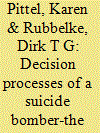| Srl | Item |
| 1 |
ID:
112390


|
|
|
|
|
| Publication |
2012.
|
| Summary/Abstract |
This paper provides a theoretical analysis of suicide attacks and defection. First, decision processes of potential attackers are examined from an economist's perspective. The results are then applied to insights from behavioural economics and psychology. We derive conditions under which agents decide to become suicide bombers-or to announce an attack and defect later. Taking account of hyperbolic discounting we show why the decision to commit a suicide attack can be time-inconsistent and what internal manipulation mechanisms (arising from cognitive dissonance and terror management) and external manipulation mechanisms (employed by terrorist organizations and governments) might prevent or foster time-inconsistency.
|
|
|
|
|
|
|
|
|
|
|
|
|
|
|
|
| 2 |
ID:
103722


|
|
|
|
|
| Publication |
2011.
|
| Summary/Abstract |
Previous research has identified economic and political factors that can contribute to the outbreak and the duration of armed conflicts. However, the psychological factors that may play a role in conflict escalation and duration have received less attention. Adopting a psychological perspective, the present study aims to investigate the role of death awareness in the context of an armed conflict. To this aim, basic assumptions derived from Terror Management Theory (TMT) were examined in an African civil war context. According to TMT, people manage awareness of inevitable death by increased striving for self-esteem and increased adherence to their cultural values. Students from the University of Abidjan (Ivory Coast), located in the pro-governmental part of the country, were randomly assigned to a mortality salience or a control condition and completed measures of self-esteem and government/army support. As expected, reminding participants of their possible death during the ongoing conflict exacerbated self-esteem, as well as support for the actions of the government and its army, compared to a control condition. Given that mortality is chronically salient in the context of a civil war, these effects can lead to conflict intensification by increasing not only each side's support for their leaders, but also the value that members of confronted sides attribute to themselves. The findings are discussed in terms of the role of mortality salience in conflict escalation and the importance of carefully dealing with the past in post-conflict societies.
|
|
|
|
|
|
|
|
|
|
|
|
|
|
|
|